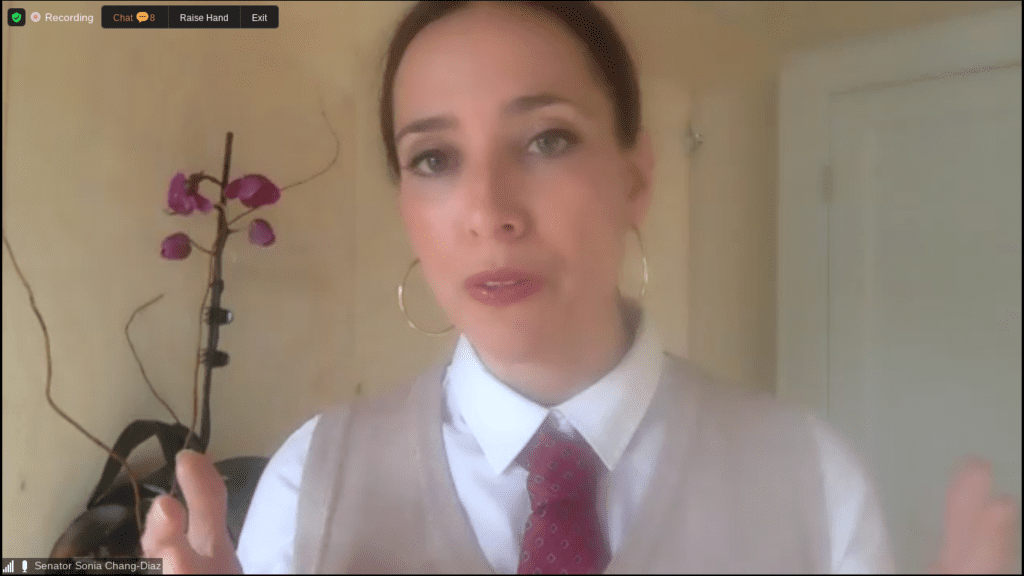Coalition blasts Baker’s vaccine rollout
Baker’s focus on large venues comes at the cost of local centers

Public health, racial justice and immigrant rights advocates are calling on Gov. Charlie Baker to implement improvements in the vaccine rollout to better include communities of color and those hit hardest by the COVID-19 pandemic.
The newly formed Vaccine Equity Now! Coalition held a virtual press conference on Feb. 17 to share its list of five demands for the Baker administration to follow. Some of the demands include more money, more doses and a point person or vaccine czar focused specifically on vaccine equity.
Carlene Pavlos, executive director of the Massachusetts Public Health Association and a co-chair of the new coalition, said clear goals and data are needed if the administration is serious about having equity be at the center of its rollout.
“For Blacks and Latinx residents of Massachusetts there is a hugely disproportionate share of the burden of COVID, yet a dramatically disproportionate access and uptake of the vaccine,” Pavlos said.
Her group is asking that at least 10% and at least 15% of doses go to Black and Latinx communities, respectively, to match the disproportionate impact that the virus has had in terms of infection rates, hospitalizations and deaths in those communities.
Pavlos explained how a vaccine czar given authority and accountability could work with and listen to the communities experiencing racism and discrimination in order to address issues of vaccine hesitancy and access.
Eva Millona, President and CEO of the Massachusetts Immigrant & Refugee Advocacy Coalition and another Vaccine Equity Now! co-chair, said the group would like the Baker administration to provide $10 million to trusted community groups and organizations. She said the money would be used for outreach and engagement around vaccination.
Senator Sonia Chang-Diaz, who represents the 2nd Suffolk District, co-sponsored a bill calling for a mobile vaccination program for getting people to the vaccine or the vaccine to the people.
She and Rep. Liz Miranda, who represents the 5th Suffolk District, said their vaccine equities bill has some overlap with the coalition’s demands.
Lawyers for Civil Rights Executive Director Ivan Espinoza-Madrigal, speaking at the press conference, called the state’s vaccine rollout plan “botched.” He said equitable access to the vaccine is “a critical racial justice issue.”
Prior to the press conference, Baker announced that he was adding severe to moderate asthma as one of the qualifying comorbidities for the next group eligible to receive the vaccine. He cited asthma as being “an environmental and economic justice issue” in his reasoning.
Baker also awarded $1 million to underserved communities for the vaccine rollout and identified 20 municipalities, including Boston, that the Department of Health will work with to address vaccine awareness and hesitancy.
Espinoza-Madrigal said the rollout could improve in these communities if the state took less of a “top-down” approach in its vaccine rollout. He’s calling for more communication and collaboration with trusted community-based and local groups as is the entire coalition.
“It is critical that, instead of using a top-down approach, the state consult with community-based groups and incorporate them in a meaningful way,” Espinoza-Madrigal said.
Coalition co-chair Dr. Atyia Martin of the Black Boston COVID-19 Coalition said the state’s plan calls for an additional 20% of vaccine to go to communities of color, which has not yet happened. She wants to make sure that those doses don’t go to mass vaccination sites, but rather community-based and easily accessible places in communities hardest hit based on zip codes.
Pavlos said coalition members have been told that the 20% allotment is being held up until there’s sufficient vaccine available in the state.
“It is not appropriate to wait until there’s ‘sufficient vaccine available in the state’ to make that allocation; it is precisely during times of scarcity, that implementing a measure that will bring greater equity is the most important,” Pavlos said.
Baker, during a State House press conference, blamed the federal government for lack of certainty on its vaccine allocation for states.
Espinoza-Madrigal said the state can no longer blame the federal government for its problems when it comes to the vaccine.
“The problem is state in nature,” he said, “and it is critical that this coalition speak on behalf of the thousands and thousands of people who have been unable to get vaccinated in their own backyard in Roxbury because of how botched this vaccine rollout has been.”
The coalition is asking residents to sign a petition supporting their demands for the Baker administration.
Martin said if communities of color continue to be ignored and left out of the rollout then more people will die.
Chang-Diaz said if the Baker administration doesn’t act and provide specifics or partner with the coalition to achieve its goals then the state legislature is ready to step in to address the inequities.
“[I]t can’t be a big sketch at this point,” Chang-Diaz said. “It has to be a real, full built-out plan with clear money commitments, clear leadership commitments, and those clear benchmarks for success and how we’re going to measure it going along.”






